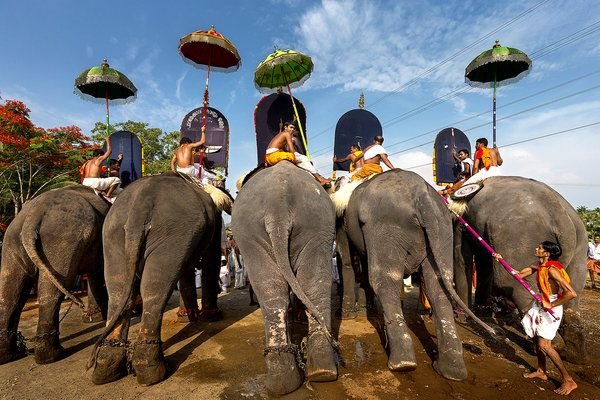It's amazing how a slight change in the way we think can manifest big changes in our reality.
Last Tuesday, I was fortunate enough to experience one such change. I was doing yoga—you know, the act of stretching your body into unnatural contortions to release physical and mental tensions—and was really feeling the downward dog posture. We were nearing the end of the practice; I was fatigued and ready to relax into shavasana (a.k.a. final relaxation) when the instructor asked us to take downward dog a step further by lifting one hand up and grabbing the opposite ankle. Pushing through the fatigue, I was able to hold that one too. Wonderful!
Once I got there and things got shaky, though, my mind started exploring the various ways this precarious pose could go wrong. Contemplating the ways I could un-pretzel face-first into the mat, I started to get nervous. My focus was slipping, and I felt my posture faltering.
The mind is amazing in its ability to explore all possible (often undesirable) outcomes vividly. Are we mentally programmed to consider “what could go wrong?” as a preemptive defense mechanism to incite retreat? In that precarious, one-handed downward dog, I asked myself that very question.

This mental programming may have served us well in the distant past, and may still be useful in many survival situations, but there are certain situations where it hinders more than it helps. Sometimes, what your mind needs isn't to imagine what can go wrong, but what can go right, giving us hope to push through discomfort. And although the mind has been programmed to do certain things through genetics, habits, experiences, and conditioning, it can also be reprogrammed.
I decided to try asking a different question. I asked:
“What does my best case scenario look like?”
Then, something interesting happened. Although it wasn't easy to come up with a really positive outcome for just one yoga session, I was able to imagine myself holding the posture with ease. Trying to see how good this “best case scenario” could get, I then imagined some other postures that helped put my body and mind in harmony, and saw myself flowing through them before coming to rest in final shavasana. In this imagined yoga session, the resulting calm would repair my fatigued muscles and invite my mind into the pure awareness of blissful existence.
In reality, I was still in downward dog. With one simple mental shift, my arm and legs stopped shaking. I stopped imagining the worst, and began to enjoy yoga in a more relaxed, optimistic state of mind. Both situations, as I was imagining them, seemed so real: I experienced falling flat on my face, followed by perfect zen poise. Neither of these things actually happened—the reality was somewhere in between—but the feelings associated with each were real.
This exercise was surprisingly fun. It took my mind off of the possibility of falling flat—it may even have prevented it.
It's almost as if each moment carries two separate experiences. One negative; one positive. If we could relive a moment, we could try it both ways; but we only get one try. The interesting thing is: we can always choose which of these two we'd like to live. Did you know that you had this power?

During that yoga pose, I first chose the negative path, though I did so unconsciously. Then, realizing it wasn't the path I wanted to take (and not wanting to see where it led) I consciously changed paths. Taking the second path was a choice, and although it took an extra initial effort to set my mind right, this investment paid off immensely. I felt good, and I realized that I could choose to feel good. Every moment offers us that choice.
Once I got used to this idea, I started having fun with it. What's the best case scenario for this email I'm sending? How about for my bike ride home from work? I imagined some possible outcomes and picked the one that really caught my fancy; in my mind, each seemingly mundane event somehow sparked incredible, joyous events that brought happiness and laughter to a bunch of people. Interestingly, each new best case scenario opened my mind to opportunities for creating joy and positivity; real opportunities that I could implement in my life!
All the breaks you need in life wait within your imagination…. Imagination is the workshop of your mind, capable of turning mind energy into accomplishment and wealth. - Napoleon HillThis question became my week's mantra. Whatever I was doing, I'd imagine ways it could go from mundane to incredible.
It was fun because this exercise takes imagination; something we don't often get license to consciously use during the day. Now, we're ready to rediscover this incredible tool. Not only will imagination make your mind soar and give your desires wings, you'll notice the incredible power it has to invite the things you've imagined into your life. Once you come up with these best case scenarios, you have something to shoot for! Sure, it may be lightyears beyond what you realistically believe is possible for you today, but just having a target to aim at will point your bow in the right direction.
Unrealistic goals: the best way to expand what you consider “realistic”
After finally moving out of that yoga pose and into final relaxation, I was able to appreciate the magnitude of what I'd discovered. Something interesting to note about the shavasana relaxation pose is that it's also known as “corpse pose”. Although you're just laying on your back, many yogis consider this pose the point of yoga, as well as the most difficult posture to properly achieve. Why do you suppose that is?
Most yoga poses have an ideal form, a “perfect” posture that practitioners can actively strive towards. Shavasana, however, is a passive posture; we let go of everything, and improving our form is achieved by letting go more. The corpse pose is an allowing of the energies that we conjured during our practice to be integrated into the body and mind.
This is why shavasana is too important to be overlooked. It's an important step that brings the rest of our practice into balance, and increasing the value of each individual pose because we've taken the time to assimilate the knowledge hidden within each.
Yoga pushes us to the limit of our physical capabilities by releasing tensions; both in terms of flexibility and mental blockages. With each posture, we're pushed to our limits, and then slightly beyond, because we're getting to know ourselves a little more. Our understanding of ourselves is expanded. Following this up with a passive posture means we'll appreciate this understanding all the more, and remember it.
When it is obvious that the goals cannot be reached, don't adjust the goals, adjust the action steps. - Confucius
Small internal changes mean big external changes
The mind is an incredible thing; when we learn something new about it, it's as if a whole new world opens up to us. Since your mind is intricately involved in every aspect of life (some would say it makes up the entirety of life), the slightest change in the way it interprets the world can incite an incredible transformation.
I've been interested in personal development for a long time. Although there are many lessons and ways to approach this study, it's essentially the study of self. The goal is to be a better person every single day. By studying ourselves and our interactions with the world, we can change our thinking, and thereby our habits, to become a better version of ourselves. This is personal development.
What's your best case scenario for today? What would need to happen for you to say, while getting into bed tonight, “today was the best day of my life so far.” I added those last two words, “so far”, because with this practice, your best case scenario gets better and better. You're using your imagination, and there's no limit to how far you can take that. Every day will be better and better, and it should! This is what life is all about.
References:
- Napoleon Hill, Think and Grow Rich
- Confucius, The Analects
- Yoga Journal, Purpose of Corpse Pose - by Richard Rosen